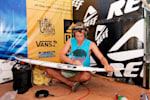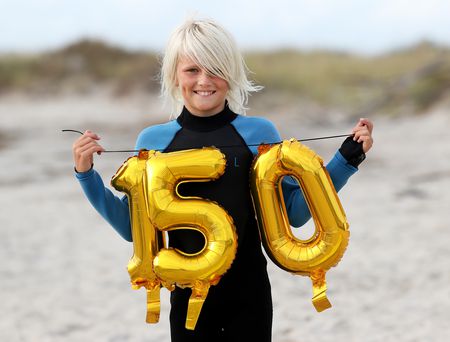Andrew Cotton knows better than most how unpredictable the sea can be. Britain’s foremost big wave surfer, Cotton spends his time hunting down the world’s scariest walls of water, like the 60-footer that crashed over him last year while surfing in Nazaré, Portugal. It’s a place famed for its sky-scraper-high swell, the kind that can kill if you mistime your ride by a second. Cotton was lucky to escape with just a broken vertebrae, months of recovery, and the World Surf League .
Being a back-on-the-horse kind of guy, he was in the water just seven months later and has even returned to Nazaré, where he spends his winters surfing what he calls the “moving mountains” of the Atlantic.
A core member of Breitling’s Surfer Squad, Cotton is an athlete possessed with skill, toughness and the kind of dedication to his work that has seen him miss Christmas, amongst other things, in pursuit of the perfect wave. Esquire met him (on land), to find out how, and why, he does it.
Where’s your favourite place in the world to surf?
In the past, the biggest waves have always been around America. You have Mavericks, a monster break in California and some huge waves in Maui, but recently the best place to surf in the world is Nazaré. California has always been associated with big wave surfing, but now it’s all happening in Europe. You don’t necessarily have to travel halfway around the world to find big waves.
Why do you think that is?
Nazaré is unusual because there’s a huge underground canyon, 5,000 metres deep, that runs really close to the shore. This creates consistent waves that can be 100ft high. It’s a scary place. I’ve also surfed a lot on the west coast of Ireland. It’s really wild and beautiful over there.
What makes you want to surf those kinds of waves?
I’m terrible at competitions. Anything with scoring and judges, all of that. I grew up in Devon and I’ve always surfed, but I never thought that I could make a living out of it. I was a plumber for a long time and that funded my surfing. I didn’t consider being a ‘big wave’ surfer, I just started chasing bigger waves and swells around Europe. I suppose my passion for it and that sort of hunger took things forward from there.
What kind of traits do you need to be successful as a surfer under those conditions? What sets you apart?
Your thought process can trigger a lot. If you panic when you’re under water, if you end up falling, then you can quickly find yourself in trouble with your breathing and things can spiral from there. It’s about keeping calm under pressure and controlling your fear. People might think it’s a reckless job and maybe I was a bit in my twenties, but now I’m quite analytical. I trust myself and I trust my team. No matter how fit you are, you won’t beat the ocean, so you have to learn how to stay calm and focused. I think I’m quite good at that now.
Do you ever worry about sharks when you’re surfing?
It’s actually never been a worry for me. I remember surfing off a place called Denmark, in Western Australia, that’s extremely ‘sharky’. In between waves all the locals would be rushing back to their jet skis, and I was just hanging out on my board paddling around. They thought I was crazy, because the water around there is infested with sharks, but I’ve never had a bad experience. Your chances of being attacked are tiny and, you know, the ocean is a place that can be dangerous, but you can’t worry about it as a surfer.
Does your work feel like a job? Or is it more of an obsession?
It’s amazing, but surfing is also a curse. I’m always missing things with family and friends. Constant birthdays and Christmases because I’ve been on a flight, chasing a good swell. You’re constantly thinking about weather charts and predicted forecasts. I’ll be off to Portugal or Ireland and it is an obsession, but it’s also my passion. I’m really fortunate to have such a supportive family who understand why I need to do this.
And how did the partnership with Breitling begin?
It was the beginning of this summer. I’m not really sure how they found me, I guess they must have seen my videos and documentaries. There was a phone call and that was that. It’s been a dream come true. I knew about their work with Kelly Slater, so being involved in the Surfer Squad has been brilliant.
What do you need from your watch when it comes to your work?
First of all, it has to be tough. I’m out in the water getting hit by waves that feel like they’re going to rip your arm off, so I can’t be worrying about whether my watch is going to survive an impact. I wear the Superocean 44 and have recently done six weeks of training where I’ve barely taken it off. My dad thought I was mad, but there’ve been no issues.
When you’re back on land, do you immediately miss the water? Or is there joy there too?
Over the last few years I’ve had a lot of time away from the water because of injuries and whatnot, so you do get used to it. I love time at home, but there is a little thought in the back of your mind that wants to be out there chasing the next wave. It’s funny, all that effort for something that can be over in six seconds. It’s a strange pursuit.
Like this article? Sign up to our newsletter to get more delivered straight to your inbox







Recent Comments